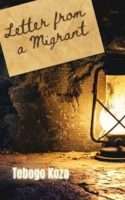The migrant song chimes, “Thula mntanami, ukhalelani, zizojika izinto,” as the train slithers towards the land of gold. It’s like a great snake, belching up its prey, and coughing them out after some time, to make for space for others.
This memory is where I would like to begin this long letter to you, which, given my current health and predicament, I find hard to pen. The least I can do is to pour my heart out first hand, to you, daughter of mine.
My mind hurriedly goes back in time, while I’m lying in this hospital bed.
I wonder if you still love lullabies or hearing a reading, soothing voice to go to sleep? If your eyes still glint pleasurably at the sight of a small movable object you would gladly toss around … Maybe it’s the effects of aging, urging me to go back that far in recollection, but that’s what I fondly remember of you.
To put it all into telescoping perspective, let me start out by telling everything that my rusty brain can dare to forge into crystal-clear memory.
I was 17 years old when I stopped working the local farms of the homestead. This was after an elderly village man, Mr Ray Makhura, approached me. He told me to instead go to Johannesburg, to better position myself as a man. I would have enough to send back home, and have better future prospects.
Although he had good intentions, to some degree I wish I hadn’t listened to him and taken up the offer.
But I was eager for success and lusted after the glory that comes with providing for my loved ones, as a man. So much so, that in the end I completely abandoned the things that give the most meaning to life.
After a long-winded year of horrible temporary jobs – running errands, cutting grass, cleaning pools for the white men – I still had no tangible prospect of fulfilling my urgency to find a solid post. And, with stringent apartheid pass laws, my movement was restricted.
I went back home to gather thought, some strength, and rest. And yet, still, I laid an eager ear to the ground for some work in Johannesburg.
Nothing had changed in my home in Sekhukhuneland, Limpopo. The road was still gravel, cow dung plastered the homes of many, and life went by incredibly slow. The only night sounds were crickets, and light was but a firefly and a candle wick that flickered.
Then one day, as I was out in the wide, thicketed plains, guarding the households’ grazing cattle … as if by immaculate conception, I met the most beautiful girl I have, to this day, laid eyes upon.
She had long, intricately plaited, woollen hair, and a clear brown skin that shone so luminous, like brass.
I was smitten. Head over heels … Even as I write this letter, the pleasurable chagrin, the pain, of sweet memory twists my face.
She walked towards me, and time froze, and each step she took was one delayed filmographic frame superimposed to another.
For some period, our eyes locked, and I trembled in fearful anticipation at her presence … Something in how she walked, and the elegant clothing she wore, spoke of being from a well-to-do family.
“Good day miss … How are you?” I said in a subdued voice.
“I’m good, mister. And you?” she warmly answered, with a slight gleam at the corners of her mouth.
“I’m great, but my day would be even more decorated … if … um, may I walk you, miss?” I pushed my luck.
“Yes.”
I still remember how that one word sent my blood rushing, my body hair rising. You should’ve seen me. I was too excited, ready to blast open like a flower sprouting from concrete in mid-summer. Then and there I dropped my staff on the ground, and completely abandoned my herd boy tasks.
Between each other’s eyes, fire burned furiously. Our bodies walked side-by-side, magnetically; two stars that awaited collision to augment their brightness into one.
After a long, intense, heartfelt conversation with Lesedi (for that was her name), I walked back to the cattle. My mind was helter-skelter. My head felt like it was in clouds – in short, I was love struck. I crept under the shade of the baobab tree, as the sun softly leapt to the west. For a while, I had forgotten about my duties.
It was only when the cows mooed from disturbingly afar that I finally gathered thought to attend to my new task – a comedy and melodrama of having to apologize to the villagers whose homes were being ravaged by scattered cattle.
And as I walked home, I knew in the heart of my hearts, she was going to be your mother.
But lo-and-behold. You should never count your chickens before they hatch. Because what was waiting ahead of us, was beyond our limited control.
Tell us what you think: The colourful, vivid, literary vocabulary and style of author Tebogo Khosa lends itself to reading aloud. Or dramatic monologue. Yes or no? Try it!

